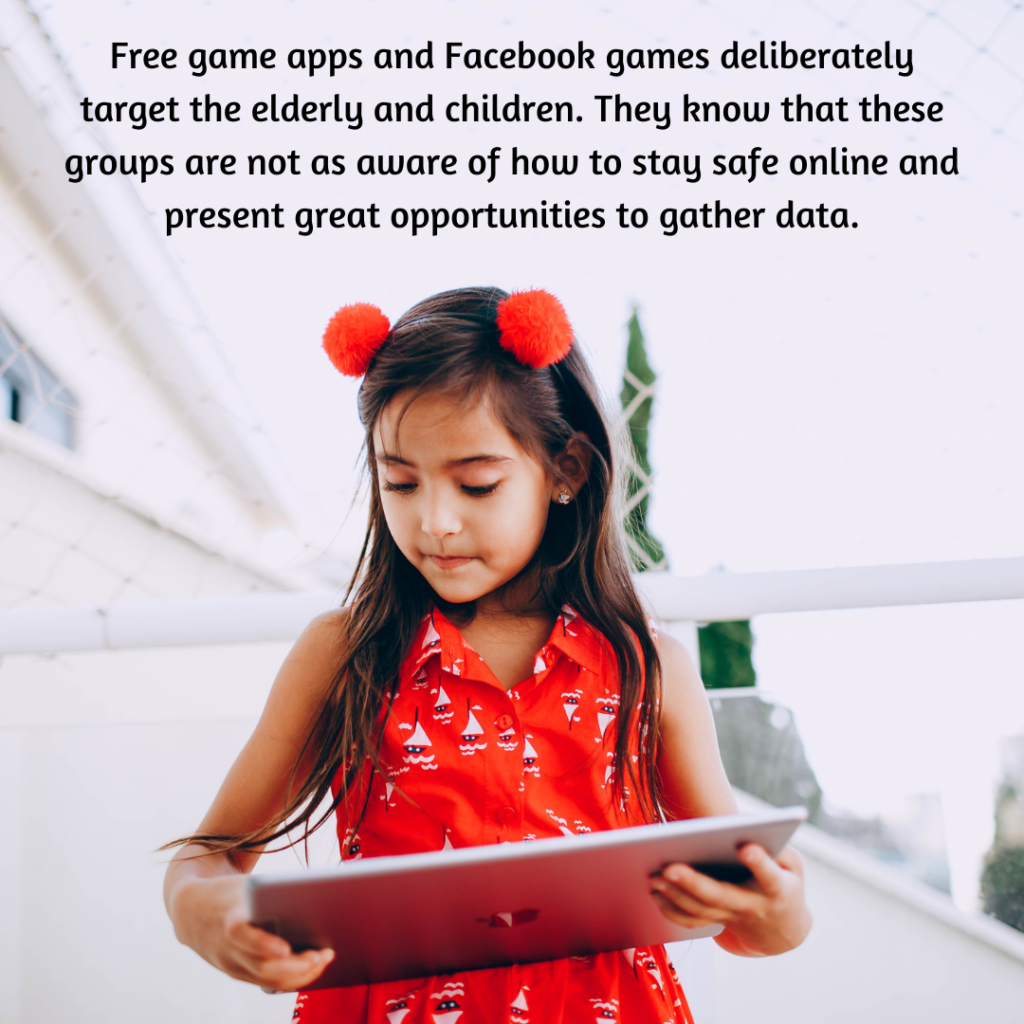When I see my grandmother playing free games apps on her iPad, it makes me really mad. She insists that they are free and she doesn’t pay for anything so it’s ok. Truly, it doesn’t matter if she didn’t give them anything. What makes me mad is what I know they are taking from her. She is not tech-savvy enough to understand that giving an app access to her phone can expose her personal and financial information even if she doesn’t volunteer it. That’s why it is more important than ever to be aware of this simple rule of the internet: If you aren’t paying for it, YOU are the product.
If you use ANY app or play ANY game on Facebook there’s a chance that your personal information is being leaked, stolen and/or sold right this very minute. …we know that many apps and games were really created to serve as a way for the people behind them to “mine” your personal data and profit from it.
-from “Scam alert: Your favorite Facebook app or game could be leaking your personal data to third-parties“
How You Become the Product of Free Games
Nothing in life is really free. When it comes to free apps, games, and social media platforms these companies are not providing a public service. They are not non-profits, and they do not monitor app stores and platforms as stringently as you would think.
So how do they make money from free apps, free games, and social media? First, they sell ads. Ads are the lifeblood of social media platforms like Facebook. Second, they sell data. The metrics they collect about you are very valuable to marketers and advertisers.
While not all data collection includes sensitive personal information, it is possible for them to collect and store it. That’s why we hear so much about data leaks. The more data companies collect, the less they invest in security, the more likely it is for your information to end up in the wrong hands.
Many have grown ambivalent to the practice of data collection because it has become so common. However, even if data collection seems innocuous, it can lead to major misfortunes. Identity theft and fraud are the most extreme examples, but look no further than your spam inbox to see that companies sell your email address (and more)!

Types of Free Game App Scams
Phone Dialers: After downloading, the game uses your phone to make long-distance calls without you knowing. Users are unaware until they see the numbers and charges on their phone bills. Windows phones are historically most vulnerable to these scams.
Earn Credits: Games that tell you to earn credits by watching ads or taking quizzes have some sneaky fine print! The easily missed text that explains you are signing up for recurring charges for services like free ringtone downloads and horoscopes. You don’t find out until you notice the charge on your credit card.
Phishing: Games can trick you into giving out login credentials and personal information that allows someone to take over your account, steal your identity, or steal your financial information. These commonly come as unsolicited password reset emails. Never respond to password reset emails unless you requested one within the last 10 minutes!
Malware: You might be downloading more than just a game! Free game apps can contain malicious code. This code can allow scammers and hackers access to your phone. They can read your messages, track what you type to steal passwords, and gain access to your finances. Free game apps can also contain bloatware that slows down your device and drains the battery.
Data Mining: Free Facebook Games are notorious for data mining (and so are quizzes and question threads). Facebook games are allowed to collect an extensive amount of data about you and your friends on social media. Game developers can also retain access to your information after you uninstall the game. Even if you don’t allow things in your app permissions, there is still data that they can collect that you cannot turn off! That is why it is best to not play games on Facebook at all.
Avoiding the Dangers of Free Game Apps
Free game apps and Facebook games deliberately target the elderly and children. They know that these groups are not as aware of how to stay safe online and present great opportunities to gather data. When it comes down to it, not all free games are predatory, but it can be very hard to tell the good from the bad. The best option is not to play free game apps or Facebook games. They don’t offer you any real benefit and present a large risk. However, if you are going to play them there are a few things that can help keep you safe.
- Google the name of the game and company that makes it to find out who they are and if they have a good reputation.
- Read the terms and conditions to see what data they are collecting.
- Don’t “allow” access to your phone or computer.
- Do not share any personal information on free apps or free games.
- Supervise children and vulnerable adults when they are using free game apps and social media.
- View a full list of scam apps that were found in the Google Play store here.



Recent Comments